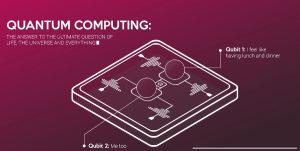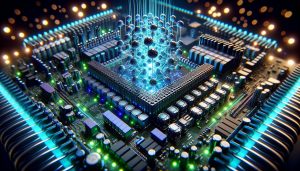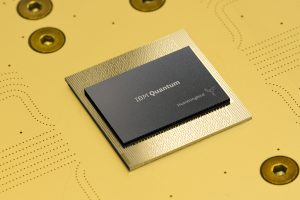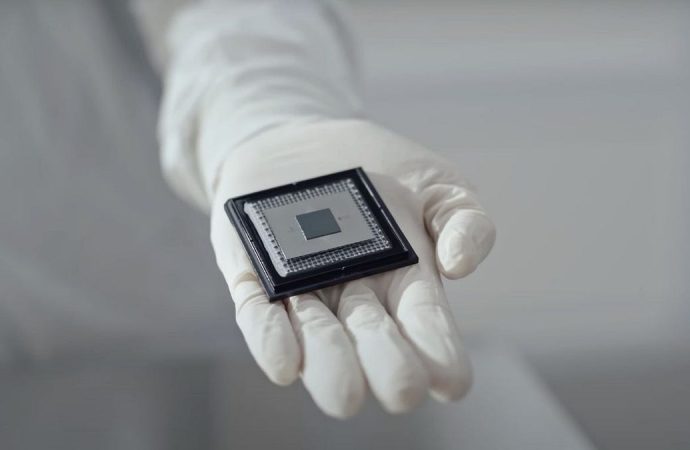Breakthroughs in Quantum Computing: What to Expect in 2024 Quantum computing, a technology that harnesses the power of quantum mechanics, is poised to revolutionize various sectors, from healthcare to finance, manufacturing, and beyond. As we approach 2024, the field of quantum computing is on the verge of significant breakthroughs that could pave the way for
Breakthroughs in Quantum Computing: What to Expect in 2024
Quantum computing, a technology that harnesses the power of quantum mechanics, is poised to revolutionize various sectors, from healthcare to finance, manufacturing, and beyond. As we approach 2024, the field of quantum computing is on the verge of significant breakthroughs that could pave the way for its large-scale application. In this article, we’ll dive into what we can expect in quantum computing in 2024, covering hardware advances, algorithmic improvements, industry applications, and global collaborations.
Introduction to Quantum Computing in 2024

Image by Yandex.com
Quantum computing is no longer just a theoretical field; it’s now an area of active development. While classical computers process information in binary form—using bits that represent either 0 or 1—quantum computers use quantum bits, or qubits. Qubits, thanks to the peculiar properties of quantum mechanics, can represent both 0 and 1 at the same time, leading to a massive increase in computational power.
In 2024, we are on the cusp of moving from experimental to more practical quantum systems. While full-scale quantum computing systems might not be ubiquitous yet, the advances expected in the next year will make quantum computing more accessible and applicable to real-world challenges.
Advancements in Quantum Hardware: A Leap Towards Scalability
In 2024, the primary focus will be on improving quantum hardware to make quantum computing more powerful and scalable. Currently, one of the main challenges facing quantum computing is creating stable qubits that can maintain their quantum state long enough to perform calculations. This is due to the phenomenon known as quantum decoherence, where qubits are sensitive to environmental interference.
IBM’s Condor Processor
IBM is at the forefront of this quantum race. In 2024, they are set to launch their Condor processor, which will feature over 1,000 qubits. This is a significant leap from the 127-qubit Eagle processor released in 2021. The key to Condor’s success lies in its improved error correction techniques, which will help mitigate some of the challenges posed by quantum noise and instability.
Google’s Quantum Roadmap
Google, which made headlines in 2019 for achieving quantum supremacy (the point at which a quantum computer can perform a task that is impossible for classical computers), continues to develop its quantum computing technology. In 2024, Google plans to expand its quantum systems, pushing towards larger qubit counts and enhanced error correction. Their goal is to build a quantum computer that can handle more complex real-world tasks, such as simulating molecular interactions, which would have significant implications for industries like pharmaceuticals.
Rigetti’s Quantum Cloud Services
Rigetti Computing is another player to watch in 2024. The company’s focus is on making quantum computing accessible through its cloud platform, Forest. Rigetti plans to expand Forest’s capabilities by adding more qubits and improved simulation tools, enabling researchers and businesses to experiment with quantum computing without needing access to expensive hardware.
Breakthroughs in Quantum Error Correction

Image by Yandex.com
One of the primary hurdles in scaling quantum computing is error correction. Qubits are extremely sensitive to external interference, and even the smallest disruption can cause errors in calculations. To address this, researchers are working on advanced quantum error correction techniques.
Surface Codes and Topological Qubits
One of the most promising solutions is the use of surface codes and topological qubits. Surface codes are a method of encoding information in a way that makes quantum systems more robust to errors. Topological qubits, which are less sensitive to noise, could provide a foundation for fault-tolerant quantum computers. In 2024, we expect further developments in these error-correction approaches, which will bring us closer to reliable, large-scale quantum systems.
Quantum Algorithms and Software Development
While hardware improvements are critical, the development of quantum algorithms is equally important. Quantum algorithms allow quantum computers to solve problems that are intractable for classical systems. In 2024, several key areas of quantum algorithm development will gain traction.
Quantum Machine Learning (QML)
Quantum machine learning (QML) is a rapidly emerging field that combines quantum computing with machine learning techniques. Quantum computers have the potential to accelerate certain machine learning processes, such as training models, exponentially. In 2024, we will see more advanced QML algorithms, which could have significant impacts on AI, data analytics, and other fields. For example, quantum algorithms could be used to process massive datasets more efficiently, enabling faster decision-making and predictive modeling.
Quantum Simulation for Material Science
Quantum computers excel at simulating quantum systems. In the near future, this capability will revolutionize material science. In 2024, quantum computing could be used to model complex materials at the atomic level, potentially leading to breakthroughs in areas such as energy storage, semiconductors, and drug discovery. By accurately simulating the behavior of molecules, quantum computers could drastically speed up the process of developing new materials.
Hybrid Quantum-Classical Systems: Bridging the Gap
Since large-scale quantum computers are still in the early stages of development, hybrid systems that combine classical and quantum computing are becoming more common. Hybrid quantum-classical systems use classical computers to handle standard tasks, such as data input and output, while quantum processors tackle specific computationally intensive problems.
Applications of Hybrid Systems
These hybrid systems are already being used for a variety of applications, from optimizing complex logistics networks to improving financial modeling. In 2024, hybrid systems will continue to evolve, integrating more seamlessly with existing infrastructure. Companies like IBM and Microsoft are already experimenting with hybrid systems, allowing organizations to harness the power of quantum computing without needing to fully transition to quantum hardware.
Quantum Computing in Cryptography: A New Era of Security
One of the most talked-about applications of quantum computing is its potential to break classical encryption methods. Quantum algorithms, such as Shor’s algorithm, could potentially factor large numbers exponentially faster than classical computers, posing a threat to the security of cryptographic systems.
Post-Quantum Cryptography (PQC)
In response to this, researchers are working on developing post-quantum cryptography (PQC) algorithms that would be resistant to attacks from quantum computers. NIST (National Institute of Standards and Technology) is already in the process of standardizing PQC algorithms, with several expected to be implemented in 2024.
Quantum Key Distribution (QKD)
Another breakthrough in quantum cryptography is quantum key distribution (QKD). This method uses the principles of quantum mechanics to ensure secure communication. If anyone intercepts the data during transmission, it will be detected immediately due to the nature of quantum measurement. In 2024, we can expect more widespread deployment of QKD technology, especially in sectors like banking and national security.
Quantum Cloud Computing: Democratizing Access to Quantum Power
One of the key trends in quantum computing is the rise of quantum cloud services. By offering quantum computing through the cloud, companies like Amazon, Microsoft, and IBM are making quantum power more accessible.
Amazon Braket and Microsoft Azure Quantum
Amazon Braket and Microsoft Azure Quantum are two major cloud platforms that allow users to run quantum algorithms on real quantum hardware via the cloud. These platforms offer businesses and researchers the ability to experiment with quantum computing without investing in expensive hardware. In 2024, these platforms will continue to expand, providing greater access to quantum computing capabilities.
Quantum Computing’s Role in Industry: Real-World Applications

Image by Yandex.com
Quantum computing holds immense potential for transforming industries. In 2024, industries such as healthcare, finance, and logistics will begin to see more practical applications of quantum computing.
Healthcare and Pharmaceuticals
Quantum computers could speed up drug discovery by simulating molecular interactions at a level of detail that classical computers cannot achieve. For example, in the search for cancer treatments, quantum computers could simulate how different molecules interact with cancer cells, leading to more efficient and targeted drug development.
Finance
In finance, quantum computing could revolutionize portfolio optimization, risk analysis, and fraud detection. Quantum algorithms have the potential to solve complex financial models faster than classical systems, helping financial institutions make better and faster decisions.
International Collaborations and Investments in Quantum Computing
Quantum computing is a global endeavor, with governments, research institutions, and corporations around the world investing heavily in its development. In 2024, international collaborations will play a crucial role in pushing the field forward.
China and the Quantum Race
China is making significant strides in quantum research and is expected to continue expanding its efforts in 2024. China’s government has heavily invested in quantum research, focusing on quantum communication, quantum simulation, and quantum cryptography.
The European Union’s Quantum Flagship Program
The European Union is also investing in quantum technologies through its Quantum Flagship program, which supports large-scale, long-term quantum research projects. By 2024, this program is expected to drive major advances in both quantum hardware and software development.
Conclusion:
As we move toward 2024, quantum computing is on the brink of a new era. From more powerful quantum hardware to breakthroughs in algorithms, error correction, and real-world applications, we are poised for significant advancements. These developments will open up new possibilities in fields ranging from cryptography and machine learning to material science and healthcare.
While large-scale quantum computers are still a few years away, the progress we can expect in 2024 will lay the foundation for the future of quantum technology. Businesses, researchers, and governments will continue to invest heavily in quantum research, and by 2024, we can expect to see practical, real-world applications that will change industries forever.
FAQs
1. What is quantum computing?
Quantum computing uses qubits to process information in ways that classical computers cannot, making it possible to solve certain types of problems exponentially faster.
2. How is quantum computing different from classical computing?
Classical computers use bits that are either 0 or 1, while quantum computers use qubits, which can represent both 0 and 1 simultaneously, allowing for more complex computations.
3. What role does quantum computing play in cryptography?
Quantum computing could break classical encryption methods but also help develop more secure quantum cryptographic methods like post-quantum cryptography and quantum key distribution.
4. How will quantum computing impact industries?
Quantum computing will revolutionize industries like healthcare, finance, and logistics by enabling faster simulations, optimized algorithms, and more efficient decision-making.
5. What are hybrid quantum-classical systems?
Hybrid quantum-classical systems combine classical computing with quantum processors to solve problems more efficiently by leveraging the strengths of both systems.
















